Do you know the Korean words that will get you speaking the fastest? Learn this basic Korean vocabulary, and you’ll be having conversations sooner than you think!
Here is a list of some of the common basic Korean words:
- Hello – 안녕하세요 (annyeonghaseyo)
- Please – 주세요 (juseyo)
- Sorry – 죄송합니다 (joesonghamnida)
- Thank you – 고맙습니다 (gomapseumnida)
- Yes – 네 (ne)
- No – 아니요 (aniyo)
- Maybe – 아마도 (amado)
- Help – 도와 주세요 (dowa juseyo)
- Excuse me – 저기요 (jeogiyo)
Below, we’ll cover more of the basic vocabulary that is commonly used in the language.
Useful Korean Vocabulary List
In the lists below, we’ve included audio of the Korean terms to help you with your Korean listening and pronunciation skills. Just click the speaker icon next to each word and repeat it. This will help you speak the Korean language properly. There are examples with English translations next to the words so you can see how they are commonly used in the language and daily conversations, and learn more about each sentence structure.
Many of these Korean terms will be used in common everyday phrases, so it pays to learn them!
We’ve written them in both Hangeul and in romanized English. If you can’t read Hangeul yet, grab your free language guide here and be reading before your next meal.
Ready for some fun? Let’s do this!
Basic Korean Words
These are the most common Korean words you will hear in everyday language discussions and chats. These are great words to know, along with how to write your name in Korean and how to do a simple self-introduction.
Learn these key vocabulary, and you’ll start to get the gist of the language you hear in conversations, songs, movies, and dramas right away! These will be a great help in getting you to speak Korean.
| Korean Word | Meaning in English | Example Sentence |
|---|---|---|
| 집 (jip) | house | (jibe dochakaesseoyo) I arrived at my house. |
| 화장실 (hwajangsil) | bathroom | (hwajangsil apeseo isipbunina gidaryeosseoyo.) I waited in front of the bathroom for 20 minutes. |
| 나라 (nara) | country | (naneun ttatteuthan naraga neomu joa!) I really like warm countries! |
| 직업 (jigeop) | job | (jigeobi mwoyeyo?) What's the person's job? |
| 사람 (saram) | person | (eoneu nara saramieyo?) What country are you from? |
| 왼쪽 (oenjjok) | left | (geurimeul oenjjogeuro olgyeojuseyo.) Please move the picture to the left. |
| 오른쪽 (oreunjjok) | right | (naerisil muneun oreunjjogimnida) The exit door is on the right. |
| 네 (ne) | yes | (ne, oneul jogeum pigonhaeyo.) Yes, I'm a little tired today. |
| 아니요 (aniyo) | no | (aniyo. bulmanitseumnida!) No. I have a complaint. |
Easy Korean Words
These are words that you can easily learn and remember. You may hear these terms in Korean dramas, movies, variety shows, or live broadcasts of your favorite K-pop group.
Below are a few easy Korean terms you can start learning:
| Korean Word | Meaning |
|---|---|
| (ye) | yes |
| (aniyo) | no |
| (uri) | we |
| (oneul) | today |
| (eoje) | yesterday |
| (naeil) | tomorrow |
| (bam) | night/evening |
| (achim) | morning |
| (wae) | why |
| (eonje) | when |
Korean Words for Beginners
The words in Korean for beginners like you are words you can easily learn as they are often used in Korean dramas, movies, and other entertainment channels. These are essential Korean words as they are often used in daily conversations.
Here’s a list of Korean language vocabulary for beginners:
| Korean | Meaning |
|---|---|
| (annyeonghaseyo) | Hello |
| (kamsahamnida) | Thank you |
| (cheonmaneyo) | You’re welcome |
| (jamsimanyo) | Excuse me |
| (gwaenchanayo) | Okay |
| (joisonghamnida) | I’m sorry |
| (juseyo) | Please give me |
| (mollayo) | I don’t know |
| (arayo) | I know |
| (ihaehaeyo) | I understand |
| (joayo) | Good |
| (an joayo) | Not good |
Food Vocabulary in Korean
If you’re planning on learning the Korean language, then you’re definitely going to want to know some basic Korean food vocabulary. With lots of tasty options and a huge variety, you’ll be happy you did!
Korean food plays a big part in Korean culture. Learning these simple vocabulary in Korean will be helpful as you learn Korean and South Korean culture. It’ll be easy for you to talk about food in your everyday life in South Korea if you learn these basic Korean words. Below are the basic words related to food.
| Korean Word | Meaning in English | Example Sentence |
|---|---|---|
| 물 (mul) | water | (harue mul se jan masyeoyo.) I drink 3 glasses of water a day |
| 밥 (bap) | rice | (naeil bap gachi meogeullaeyo?) Shall we eat together tomorrow? |
| (yachae) | vegetables | (sijangeseo yachaereul sasseoyo.) I bought vegetables at the market |
| 과일 (gwail) | fruit | (eotteon gwail joahaseyo?) What kind of fruit do you like? |
| (gogi) | meat | (eoje jeonyeoge gogireul guwo meogeosseoyo.) Last night I ate grilled meat |
| 빵 (ppang) | bread | (ppang meogeulttae beoteorang jaemirang gachi meogeoyo.) I eat bread with butter and jam |
| 생선 (saengseon) | fish | (saengseoneul yeol marina jabasseoyo!) I caught 10 fish! |
| 커피 (keopi) | coffee | (yeojachinguwa yumyeonghan kapee gatseumnida.) I went to a famous cafe with my girlfriend |
| 맥주 (maekju) | beer | (nae namjachinguneun maekju han byeongdo mot masyeoyo.) My boyfriend can't drink even one bottle of beer |
| 소주 (soju) | soju | (narang chinguneun sojureul joahaeyo) I like drinking soju with my friend |
Here are a few notes related to these Korean food words:
- If you want to order or ask for any of these items, add the phrase 주세요 (ju-se-yo) to any of these Korean terms. This is one of the most helpful phrases in the language. It means “Please give me.”
- If you need to ask for water at a restaurant, a good phrase to say is 물 좀 주세요 (mul jom ju-se-yo).
- The word 밥 (bap) means “rice,” so you can use it for that exact meaning. It’s also used to reference food in general, as in a meal.
- One of the most common phrases you’ll hear in Korea is “밥 먹었어요?” (bap meogeosseoyo | did you eat?). In this case, the 밥 (bap) means “food,” not specifically rice. This is a great phrase to use when you meet your friends and want to use your language skills to ask about food plans.
- To order a beer, you can say 맥주 한 병 주세요 (maekju han byeong ju-se-yo), which means “Please give me 1 bottle of beer” in English. This is a really useful phrase when you meet with friends and want to order some drinks.
Korean Family & Relationship Words
These are fantastic Korean family words to learn to help you understand everyday conversations. You’ll definitely need these if you’re going to meet and talk to Koreans in their language!
You’ll also hear Koreans say them often in K-Dramas and K-Pop lyrics. Get to recognize them in your favorite Korean shows and movies–or just listen for them in regular conversations.
They’re sure to show up, and you’ll be one step closer to understanding the Korean language!
| Korean Word | Meaning in English | Example Sentence |
|---|---|---|
| 친구 (chingu) | friend | (oneul chinguhago mannagiro haesseoyo.) I made plans to meet my friend today |
| 가족 (gajok) | family | (gajokdeulgwa hamkke yeohaengeul gayo) I go on a trip with my family |
| 아빠 (appa) | dad | (uri appa chinjeolhaseyo) My dad is kind |
| 엄마 (eomma) | mom | (eoje eommarang tonghwahaenneunde aju gippeohasyeosseo.) My mom was happy because I talked to her on the phone yesterday |
| 남자 친구 (namja chingu) | boyfriend | (ajikdo namjachinguga eopseoyo?) Do you still not have a boyfriend? |
| 여자 친구 (yeoja chingu) | girlfriend | (yeojachinguwa keopi masireo kapee gamnida.) I go to cafe to drink coffee with my girlfriend. |
| 결혼 (gyeolhon) | marriage | (daeum dare gyeolhonhal geoyeyo.) I will get married next month |
| 남편 (nampyeon) | husband | (nae cheotsarangeun jigeumui nampyeonimnida.) My first love is now my husband |
| 아내 (anae) | wife | (anaereul mannareo watseumnida.) I came out meet my wife |
Here are a few useful notes about Korean family and relationship words:
- You might hear the Korean phrase 우리 남편 (uri nampyeon | our husband). While the direct English language translation is “our husband,” it actually means “my husband.”
- The word 우리(uri | we, our) is used quite commonly to talk about things that belong to the whole group, such as the phrases 우리 나라 (uri nara | our country), 우리 집 (uri jip | our house), and 우리 아내 (uri anae | our wife).
- Another commonly used Korean vocabulary word for “wife” is 부인 (buin). You can use the two interchangeably.
- The word 친구 (chingu) means “friend,” but only same-age friends. If someone you know is a different age, then you would want to use the correct title.
- 가족 (gajok) means “family.” This Korean term will come up often in the language, so it is best to make sure you know how to talk about your family in Korean.
- You can use the word 아빠 (appa) which is similar to the English word “dad.” You can also use the slightly more respectful/formal version 아버지 (abeoji), which is similar to saying “father.”
- You can use the word 엄마 (eomma) for “mom” or 어머니 (eomeoni) for “mother.” Both are commonly used terms in the language.
Korean Time Words
Korea is an organized and fast-paced country, and we’re here to keep you on schedule! Use these Korean time words to talk about common events and when they happen.
After learning the words below, you can up your time game by learning the Korean numbers and start telling time in Korean. Having these two skills are very useful for learning the Korean language.
| Korean Word | Meaning in English | Example Sentence |
|---|---|---|
| 시간 (sigan) | time | (jeoneun han sigan dongan undonghaesseoyo) I exercised for 1 hour |
| 지금 (jigeum) | now | (jigeum jeomsim siganieyo) It's lunchtime now |
| 오늘 (oneul) | today | (oneul yaksok isseoyo?) Do you have plans today? |
| 어제 (eoje) | yesterday | (eoje pati eottaesseoyo?) How was the party yesterday? |
| 내일 (naeil) | tomorrow | (naeil yeodongsaeng saengirieyo) Tomorrow is my sister's birthday |
Korean Verbs
Did you know that you can make a sentence in Korean with just a single verb? It’s one of the great things about the simplicity of the Korean language! Learn these common verbs in Korean first and have conversations in Korean in no time. Here are the common Korean verbs that’ll help you speak Korean in daily conversations.
| Korean Word | Meaning in English | Example Sentence |
|---|---|---|
| 가다 (gada) | to go | (hagwone gamnida.) I go to the academy |
| 오다 (oda) | to come | (eonniga hotello omnida.) My sister came to the hotel from home |
| 있다 (itda) | to have | (na keodaran inhyeongeul gajigo isseo!) I have a large doll! |
| 이다 (ida) | to be | (appaga hanguk saramida.) My dad is Korean |
| 먹다 (meokda) | to eat | (goyangiga saengseoneul meogeotda.) The cat ate a fish |
| 마시다 (masida) | to drink | (dalligihago naseo mureul masimnida) I drink water after running |
| 주다 (juda) | to give | (appaga saengilseonmureul jusyeotda.) My dad bought me a birthday present |
| 보다 (boda) | to see | (galmaegireul cheoeum bwasseoyo!) This is the first time I've see a seagull! |
| 자다 (jada) | to sleep | (eojetbame neutge jatseumnida.) I went to sleep late last night |
| 일어나다 (ireonada) | to wake up or get up | (oneul ojeon ilgopsie ireonasseoyo.) I woke up today at 7am |
| 사다 (sada) | to buy | (oireul satseumnida.) I bought a cucumber |
| 쓰다 (sseuda) | to write or to use | (yeogie ireumeul sseuseyo.) Please write your name here |
| 웃다 (utda) | to laugh | (geunyeoga nareul bogo useosseoyo.) She looked at me and laughed |
| 울다 (ulda) | to cry | (apaseo harujongil ureotseumnida.) I cried all day because I was hurt |
| 입다 (ipda) | to wear | (oneulbuteo yeoreumoseul ibeulgeoeyo.) I'll start wearing summer clothes today |
| 걷다 (geotda) | to walk | (namjachinguwa soneul japgo georeosseoyo.) I walked while holding my boyfriends hand |
| (iktta) | to read | (jeil joahaneun chaegeul ilgeotseumnida.) I read my favorite book |
| 배우다 (baeuda) | to learn | (oneulbuteo unjeoneul baewoyo.) I learned to drive starting today |
| 공부하다 (gongbuhada) | to study | (hangugeo gongbu gachi hallaeyo?) Shall we study Korean together? |
| 만나다 (mannada) | to meet | (bumonimeul mannatseumnida.) I met my parents |
Once you know these Korean verbs, you can continue to make good progress in the language with Korean grammar and Korean particles.
Korean Adjectives
Korean adjectives help you a lot with your language learning as it enables you to describe objects, events, places, or feelings. As you’re starting out with your Korean language learning, you don’t need to know all of them. You just need to know the most common Korean terms.
Here are the top adjectives in Korean commonly used in everyday life. You will surely hear these as you learn the Korean language, so it’s good to add them to your vocabulary stack and get some practice with them.
| Korean Word | Meaning in English | Example Sentence |
|---|---|---|
| 좋다 (jota) | to be good | (gangajiboda goyangiga joayo.) I like cats more than dogs |
| 싫다 (silta) | to be bad | (papeurikareul sileohamnida.) I don't like bell peppers |
| (deopda) | to be hot | (ibeon yeoreumeun aju deowoyo.) This summer is really hot |
| (chupda) | to be cold | (hangugui gyeoureun chuwoyo.) Korea is cold in the winter |
| 슬프다 (seulpeuda) | to be sad | (dahuiya, wae seulpeo boyeo?) DaHee, why do you look sad? |
| (apeuda) | to be sick or in pain | (eonjebuteo baega apasseoyo?) When did your stomach start hurting? |
| 피곤하다 (pigonhada) | to be tired | (oneulttara pigonhamnida.) Today I am tired |
| (jaemiitda) | to be interesting | (i chaegeun jeongmal jaeminneungeot gatayo.) This book seems really interesting |
| (jaemieopda) | to be boring | (jibeman isseumyeon jaemieopseoyo!) I'm bored if I have to stay at home! |
| 어렵다 (eoryeopda) | to be difficult | (suhak munjega gajang eoryeopseumnida.) Math problems are the most difficult for me |
| 쉽다 (swipda) | to be easy | (jajeongeo tagiga swiwoyo?) Is it easy to ride a bicycle? |
| 깨끗하다 (kkaekkeuthada) | to be clean | (gonghangi kkaekkeuthaeyo.) The airport is clean |
| 더럽다 (deoreopda) | to be dirty | (apchimaga geumbang deoreowojyeosseoyo.) The apron just got dirty |
| (ppareuda) | to be fast | (uwa! jeongmal ppallayo.) Wow! That is really fast |
| 느리다 (neurida) | to be slow | (sigani cheoncheonhi jinagayo.) Time passes slowly |
Korean Adverbs
Another set of basic Korean words for everyday life you need to know when you learn Korean is adverbs. These are words that will be helpful as you are speaking Korean. They’ll enable you to describe verbs and adjectives that’ll make you sound more like a native.
There are many adverbs in the Korean language, but we’ll list a few of the most common ones here. Below are some of the basic Korean adverbs.
| Korean Word | Meaning | Example Sentences |
|---|---|---|
| (maeu) | very | (naneun bukangwa namhanui yeoksae maeu gwansimi isseoyo) I'm very interested in the history of North and South Korea. |
| (aju) | very | (badagi aju mikkeureowoyo. josimhaseyo) The floor is very slippery. Please be careful. |
| (kkwae) | quite | (i gabangeun kkwae mugeowoyo) This bag is quite heavy. |
| (sangdanghi) | quite | (gagyeogeun sangdanghi bissan pyeonieyo) The price is quite high. |
| (geoui) | almost | (gonghange geoui da wasseoyo) We're almost at the airport. |
| (ppalli) | fast | (joneun hangugeoreul ppalli baeugo isseoyo) John is learning the Korean language fast. |
| (cheoncheonhi) | slowly | (nae chinguga hangugeoreul cheoncheonhi baeugo isseoyo) My friend is slowly learning the Korean language. |
| (sinjunghage) | carefully | ( i munjereul sinjunghage goryeohae juseyo) Please consider this matter carefully. |
| (hangsang) | always | (geuneun hangsang bappayo) He is always busy. |
| (neul) | always | (urineun neul hamkke jeomsimeul meogeoyo) We always eat lunch together. |
| (jaju) | frequently | (saramdeureun hanguk deuramareul boneun dongan gibonjeogin hangugeo pyohyeondeureul jaju baeul su isseoyo) People can frequently learn basic Korean phrases while watching K-drama. |
| (heunhi) | frequently | (bomeneun beotkkocheul heunhi bol su isseoyo) You can see cherry blossoms commonly in spring. |
| (botong) | usually | (nae sachoneun botong hanguk eumageul deutgo hanguk deuramareul bwayo) My cousins usually listen to Korean music and watch K-drama. |
| (gakkeum) | sometimes | (sunyeongineun gakkeum chingudeurege yeongeoro malhaeyo) Soonyoung sometimes speaks English to his friends. |
| (ttaeroneun) | sometimes | (nuguna ttaeroneun silsureul haeyo) Everyone makes mistakes sometimes |
| (gakkeum) | occasionally | |
| (jomcheoreom ) | seldom | (naneun jikjange jomcheoreom jigakaji anayo) I am seldom late for work. |
| (deumulge) | rarely | (josyuaneun deumulge hangugeoreul haeyo) Joshua rarely speaks Korean. |
| (gyeolko) | never | (geu nareul gyeolko itji aneul geoyeyo) I will never forget that day. |
| (jeoldae) | never | (jeoldae geojinmareul haji anasseoyo) I never lied. |
Beautiful Korean Words
These are made up of words that are natively Korean. There are a lot of words in the Korean language that have Chinese origins. These words that have Chinese origins are oftentimes referred to as “loan words.” But in the section below, you’ll learn about a few of the many beautiful Korean terms which are natively Korean.
| Korean Word | Meaning |
|---|---|
| (haneul) | sky |
| (bi) | rain |
| (goyangi) | cat |
| (gangaji) | puppy |
| (saram) | person |
| (baram) | wind |
| (maeum) | mind/heart |
| (garam) | river |
| (bada) | ocean |
| (mireu) | dragon |
| (nareusha) | to fly |
| (narae) | wing |
| (nuri) | world |
| (nara) | nation |
Aesthetic Korean Terms
As you discover how to learn Korean vocabulary, you’ll know that there are words in the language that don’t have a direct English translation. There might be words in English that can be used to explain them, but they don’t necessarily give the exact meaning.
You might be surprised to know about them as you’ve already might have heard them from Korean dramas, movies, or even from your favorite K-pop idols.
눈치 (nunchi)
This word is translated as “sense” or “wits” in English. However, this word is more than just sense and wits. It’s one’s ability to read, feel, and understand people or situations without the need to hear what it is verbally.
A person who has 눈치 (nunchi) is able to react, do, or say something simply by observing.
This word is where the expressions 눈치가 없다 (nunchiga eopda) and 눈치가 빠르다 (nunchiga ppareuda) are based on.
눈치가 없다 (nunchiga eopda) is used for someone who doesn’t know how to weigh or understand situations. Thus making them unable to respond, react or act accordingly. 눈치가 빠르다 (nunchiga ppareuda) is its opposite, as it is used for a person who’s quick to see things through. They easily understand people and situations.
정 (jeong)
정 (jeong) is a word that can talk about affection, attachment, and feelings of connection. When Koreans use this word, they’re usually referring to the invisible bond that exists in Korean society.
효 (hyo)
This is a word that can be defined as “filial duty.” This can be used to talk about one’s devotion to one’s parents in taking care of them and taking responsibility for them until their old age.
내숭 (naesung)
내숭 is used to describe a person who is not real or in other words fake. This can be used for a person who hides their real identity or color.
애교 (aegyo)
There’s no exact one English word that can directly express the meaning of 애교 (aegyo). However, it may be defined as “acting cute” or “being lovely.”
온돌 (ondol)
This word literally means “heated rock.” However, in practice, this word is used to refer to the Korean floor heating system.
답답해 (dapdapae) or 답답하다 (dapdapada)
These 2 expressions are translated as “stuffy” or “suffocating.” However, these 2 words, when in use, can have a meaning other than “stuffy” or “suffocating.”
In usage, 답답해 or 답답하다 are used when someone feels “frustrated.” It can also be used when you get impatient or feel irritated at someone’s slowness or narrow point of view.
엄친아 (eomchina)
This word is a combination of 3 Korean words, which are 엄마 (eomma), 친구 (chingu), and 아들 (adeul). These words combined mean “son of one’s mother’s friend.” However, this isn’t exactly what 엄친아 (eomchina) means. 엄친아 (eomchina) is used to describe someone, particularly a man who is close to perfection or someone who comes from or has a good background. He could be someone better than you.
For example, a man who is very talented, smart, handsome, and has a good educational background can be described as 엄친아 (eomchina). The word used to describe women like this is 엄친딸 (eomchinttal).
어이없다 (eoieopda)
This word can express one’s unbelief of an event or news. It may also be used when you’re left speechless or have nothing to say or comment about because of an out-of-the-ordinary event.
Korean Words Vocabulary
Here are some useful vocabulary words in Korean. These are common Korean words you’ll often encounter as you learn the Korean language.
“Words” in Korean
Korean words are called 단어 (daneo). The word for vocabulary in Korean is 어휘 (eohwi) or 용어 (yongeo). There are special words in the Korean language for different types of vocabulary.
“Nouns” in Korean
The word 명사 (myeongsa) is used to talk about nouns in Korean. The different types of nouns are called 보통 명사 (botong myeongsa), 고유 명사 (goyu myeongsa), and 불가산 명사 (bulgasan myeongsa). The Korean phrases 보통 명사 (botong myeongsa), 고유 명사 (goyu myeongsa), and 불가산 명사 (bulgasan myeongsa) are used for common nouns, proper nouns, and uncountable nouns respectively.
“Verbs” in Korean
동사 (dongsa) is the word for verbs in Korean. The Korean phrases for regular and irregular verbs are 규칙동사 (gyuchik dongsa) and 불규칙 동사 (bulgyuchik dongsa).
“Adjectives” in Korean
The word for adjectives in Korean is 형용사 (hyeongyongsa).
English to Korean Words
You can write English words in Korean by sounding them out slowly in English and then writing the equivalent sounds in Korean.
Korean to English Words
You can write Korean terms in English by following the romanization rules. If you speak English originally, romanization could come in handy at the beginning. However, we highly encourage learning the Korean writing system (Hangeul). As a result, you will be able to read anything written in Korean, and your Korean pronunciation will be more accurate.
Wrap Up
That’s a lot of words, but take your time in learning them. You can also find dictionary and translator app recommendations here if you prefer using these helpful tools! Knowing these words will help you sound closer to native Korean speakers.
If you want more goodness to supercharge your Korean language and culture skills, then check out our top resources here!

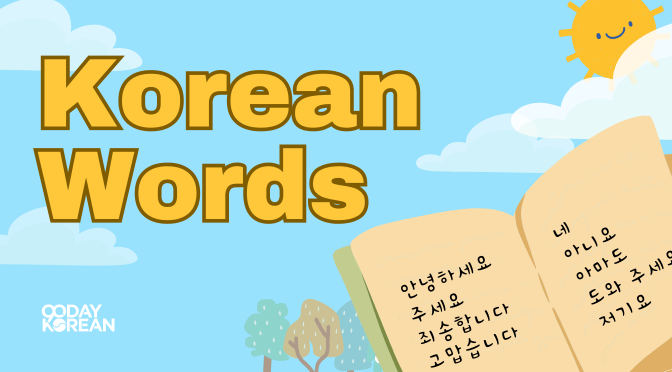

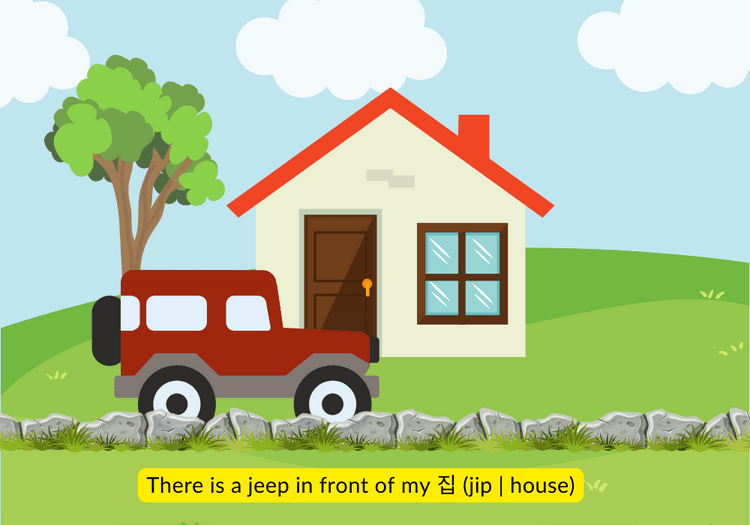





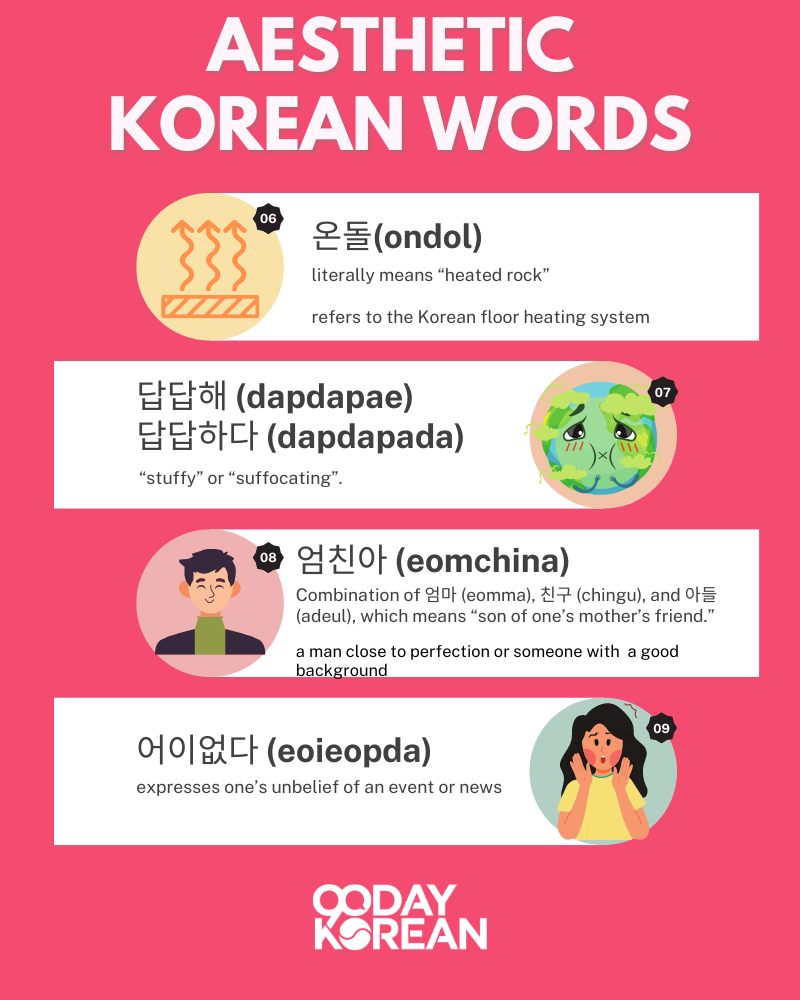
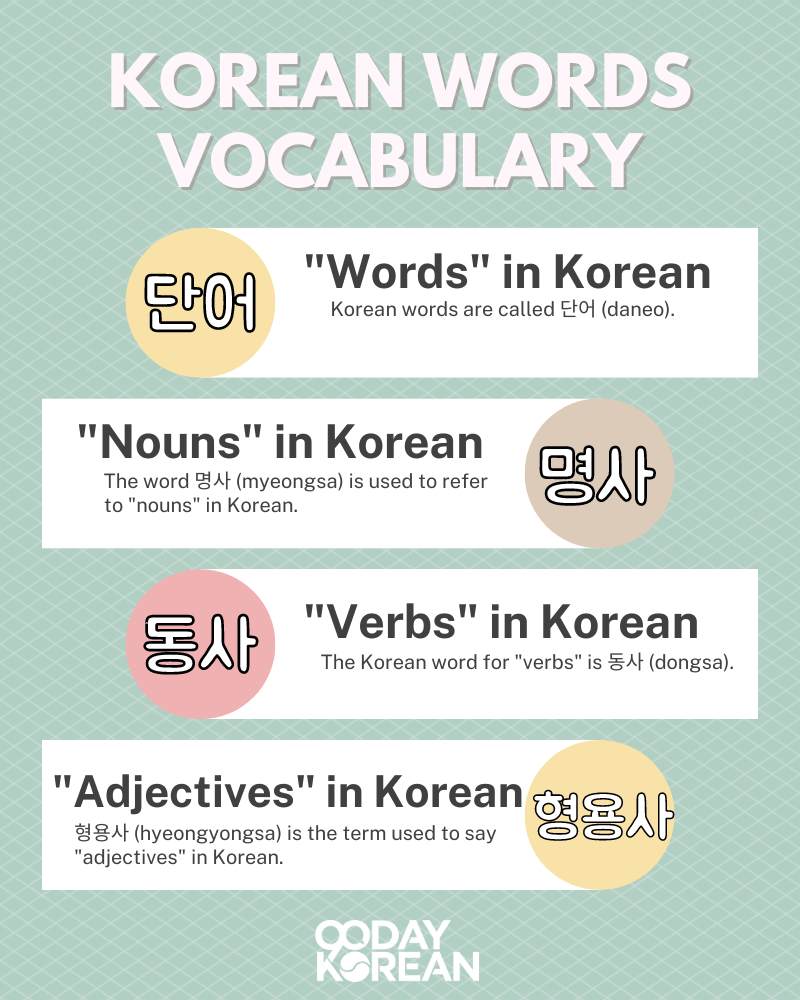


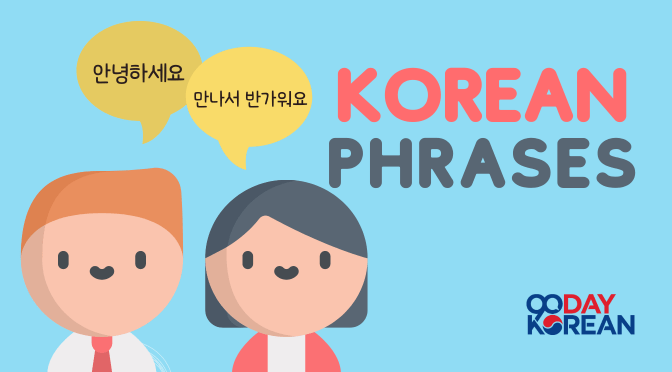

Me and my bff are making a book with different languages and I decided to do Korean myself to cause this language has inspired me! Were both now learning Korean thanks to this webiste! Thank you!!
Great! Keep going, Max! ^^
this 90 day korean has been a big help for me and my self-studying course. Thank you so much for these words and phrases, it helped me a lot.
Awesome. We’re glad that it has been valuable to you. ^^
hi
I wanted to learn Korean for so long, thanks for this sentence, so much helpful to me..
Sure, it’s our pleasure. We’re glad that it has been valuable to you. ^^
wow.. i really need this for my self study..
You can do it, Karen! 화이팅! ^^
i want to learn korean language from philippines
Great! You can start by learning the Korean alphabet! ^^ (https://www.90daykorean.com/how-to-learn-the-korean-alphabet/)